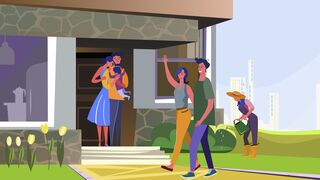Parenting
Say Good Morning to Your Neighbors
How neighborhood connections make a difference to your child’s development.
Posted November 7, 2020 Reviewed by Devon Frye

Living in a friendly neighborhood strengthens your parenting, and supports your child’s development. That is another of the bottom-line findings reported in The Origins of You, on the basis of methodical longitudinal research with over four thousand families.
Neighborhood connections can help increase a child's or adolescent’s resilience, and decrease a young person’s likelihood of engaging in self-harming, aggressive, or antisocial actions. One of the mechanisms of this is the way a neighborhood acts to support or undermine effective parenting.
Jay Belsky, Avshalom Caspi, Terrie E. Moffitt, and Richie Poulton found that the biggest factors in predicting aggression and antisocial behavior in childhood and adolescence were the level of poverty and deprivation, on the one hand, and parental warmth and structure, on the other hand. Boys who grow up in economically deprived communities were more likely to become aggressive and anti-social, but that was less likely to happen when their parents provided both warmth and monitoring, which was more likely to happen in a friendly, connected community.
Whether your community is dealing with economic deprivation, social disconnection (which can happen even in the wealthiest neighborhood), widespread drug abuse, systemic racism, relative poverty, environmental concerns, or something else, one of the best ways to increase the chances your child will grow into a happily productive adult is to strengthen social connections in your neighborhood.
Belsky and colleagues describe the importance of collective efficacy in The Origins of You. They define it as “the combination of informal social control and social cohesion, and thus the willingness of community members to look out for each other and intervene when trouble arises, especially on behalf of the community’s youths.” They describe research in Chicago that shows collective efficacy lacking in some luxury high-rises, but being strong in some of the poorest African-American neighborhoods, especially those led by a strong church.
In assessing collective efficacy, they looked for whether or not neighbors could be counted on to intervene when children were misbehaving (e.g., skipping school, spraying graffiti, disrespecting adults). They asked whether people saw their neighbors as trustworthy and sharing their values.
Belsky and colleagues found that where there was a greater sense of collective efficacy in the neighborhood, young children were less likely to behave in antisocial ways. As they got older, there was a steeper decline in antisocial behavior than happened with kids growing up in less connected neighborhoods. They concluded that supportive parenting acted as a protective factor for kids growing up in disadvantaged neighborhoods, and that collective efficacy worked as a protective factor for supportive parenting.
Their findings have important implications for parents, and for legislators and policy-makers:
1. Give your child both warmth and structure. The child who experiences warmth and structure is more resilient, and more likely to make it through to a happily productive adulthood, no matter the environment they grow up in.
2. Say good morning to your neighbors. Look for ways to establish and maintain neighborhood connections. Participate in or initiate community activities—block parties, spring clean-ups, local fundraisers, school council, church choir, neighborhood sports, whatever interests you and your child.
3. Advocate for parenting-support initiatives. All parents benefit from having places—both virtual and real—where they can make connections with each other and with various professionals, to get non-judgmental help with their problems and answers to their questions.
4. Look for ways to strengthen collective efficacy. Establish and maintain connections with your neighbors. Support neighborhood businesses and coffee shops. Be friendly to the people around you. Be good to the children in your neighborhood, and support them in learning prosocial behavior. Do that kindly, never harshly, understanding that your gently stepping into a parenting role can make a difference in their development.
It turns out that Mister Rogers was right about this: it’s good to invest a little energy in making this “a beautiful day in the neighborhood, a beautiful day for a neighbor,” and respectfully asking the question, “Won’t you be my neighbor?”
This is part of my blog series based on The Origins of You: How Childhood Shapes Later Life, by Jay Belsky, Avshalom Caspi, Terrie E. Moffitt, and Richie Poulton.
See also, in this series,




